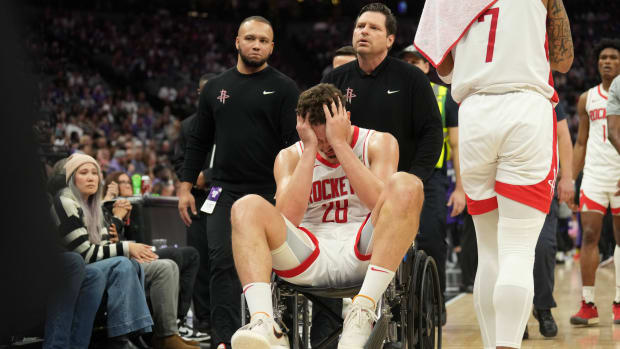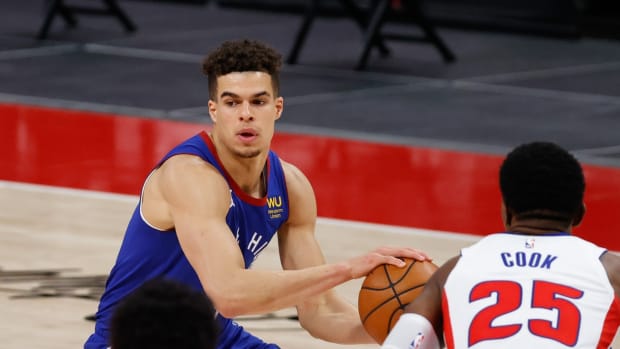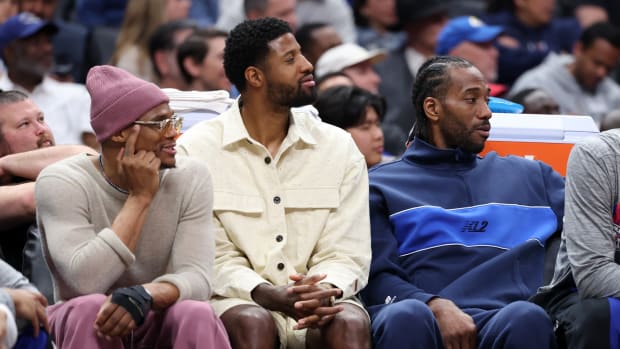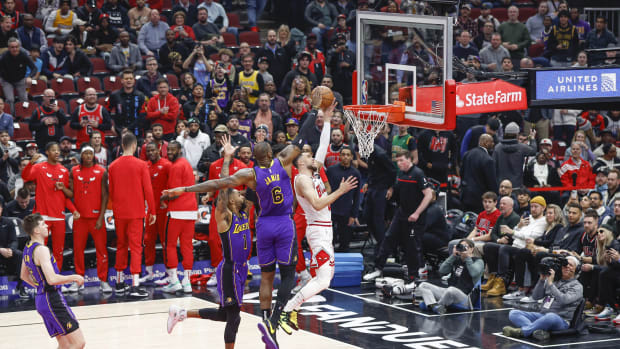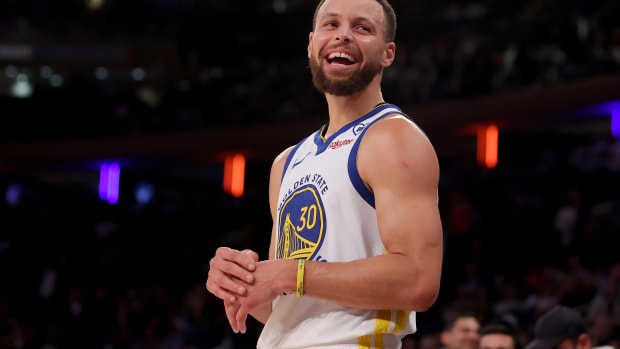Roundtable: Which NBA team took the biggest step back this off-season?
The NBA is officially amid the doldrums of its off-season. The draft, summer league and (most of) free agency have come and gone and we're still almost three months away from the new season beginning. With no pressing news to discuss, SI.com paneled its NBA experts to discuss which team took the biggest step back this off-season.
Which team took the biggest step back this summer?
Lee Jenkins: Blazers
When the Blazers woke up on March 6, they were 40-19, a contender in the Western Conference. That night, Wesley Matthews ruptured the Achilles tendon in his left foot. Over the next six weeks, they went 11-12. They were blown out by Memphis in the first round of the playoffs. And the losses were only beginning. Nicolas Batum was traded to Charlotte, LaMarcus Aldridge bolted for San Antonio, Robin Lopez for the Knicks, Matthews for the Mavericks. That’s four starters gone from a division winner. The Blazers have recouped what they could, surrounding Damian Lillard with some promising young talent, but they will take a big step back this season.
Chris Mannix: Blazers
It's simple: The biggest star to change teams was LaMarcus Aldridge, and the Blazers got nickels on the dollar to replace him. I'm not blaming Portland; Aldridge was motivated to move and there was little the Blazers could do about it. And they rebounded nicely with some timely trades and signings that should keep them competitive until GM Neil Olshey can find a second star to play alongside Damian Lillard. But this was a Western Conference contender that lost three key pieces (Aldridge, Wesley Matthews, Arron Afflalo) from its roster. No one had a rougher summer.
• MORE NBA: Which NBA team spent the most (and least) this summer?
Rob Mahoney: Mavericks
Portland—which could easily win 20-30 fewer games than it did last season—is the easy pick if we frame this question in the context of next season alone. Yet in a larger sense, I think there’s a case to be made for the Mavericks. Losing out on DeAndre Jordan cost Dallas its plan for the immediate future. Rather than roll into the summer of 2016 and beyond with an appealing core of Jordan, Chandler Parsons, and Wesley Matthews to complement Dirk Nowitzki and attract free agents, the Mavs instead could see Parsons bolt before 2016-17 player option and see their $70 million wager (up from a reported $57 million had Jordan signed) on Matthews’ recovering Achilles go sour.
If even some of the factors in play break poorly for Dallas, will Nowitzki want to extend his career on a team clawing just to make the playoffs? Will Rick Carlisle want to continue coaching a team in need of either constant roster reshuffling or a long-term rebuild? Portland lost out when LaMarcus Aldridge chose to leave, but the Blazers made at least some forward progress by amassing a roster loaded with young players. Dallas, in contrast, rallied well in acquiring Deron Williams and Zaza Pachulia to make the coming year the best it could under the circumstances. It just lost out on a strong transitional vision—in addition to a franchise centerpiece—with Jordan’s reversal. Dallas took a step back this summer from being both a 50-win team and a potential contender in the future.
Ben Golliver: Blazers
The Blazers would have been my pick if their only loss was LaMarcus Aldridge, but the All-Star power forward wasn’t the only impact player to bolt from Portland. Aldridge, 30, was the only true franchise player to change teams this summer: among this off-season's movers, he ranked No. 1 in Player Efficiency Rating, No. 1 in points per game, No. 2 in rebounds per game and No. 2 in Win Shares. The three-time All-NBA selection departed for San Antonio without compensation and the body blows continued from there. The Blazers were coming off 54 wins in 2013-14 and 51 wins in 2014-15, marking their second-best two-year stretch since the Rip City glory days of the early 1990s. Retaining Aldridge would have meant extending that window, as none of the assembled pieces were facing age-related decline. Instead, the bottom completely fell out.
2015 NBA Las Vegas Summer League: Running down biggest winners, losers
President Neil Olshey not only failed to keep Aldridge (in addition to losing three other starters), he couldn’t keep his house in order. In what was perhaps the most embarrassing non-DeAndre Jordan moment of the NBA’s summer, Blazers assistant coach Kim Hughes, an Olshey accomplice from their Clippers days, publicly opined about Aldridge’s departure before it was announced. That out-of-turn speaking ultimately cost Hughes his job, but it also reflected poorly on Olshey, who overcompensated by filibustering at a subsequent press conference. The summer was salvaged, to a degree, by the acquisitions of Noah Vonleh, Mason Plumlee (acquired from Brooklyn in a draft day trade) and a few other nice additions—but this group looks like peanuts compared to the outgoing talent.
Matt Dollinger: Kings
The Blazers will take the biggest step back in the standings, but the Kings might have set themselves back years thanks to Summer of Schadenfreude. NBA fans watched in amusement (and with mouths agape) as Sacramento made one head-scratching move after another this off-season. Vivek Ranadive was the talk of the NBA when he bought the Kings in 2013 and was hailed for his innovative ideas. Two years later he's still the talk of the league—but now for his idiotic ideas. He went through three coaches in two months during the season and turned his front office into a nightmarish version of King of the Mountain. It's been well-documented that his head coach (George Karl, for now) and best player (DeMarcus Cousins) openly dislike one another. His new point guard (Rajon Rondo) has been more of a deterrent than a distributor in recent years. And his lottery pick (Willie Cauley-Stein) doesn't seem to fit at all in the team's long- or short-term vision. To top it all off, Ranadive reportedly flirted with handing over the franchise reins to John Calipari this summer. He's given carte blanche to new team president Vlade Divac, despite the former player having no front-office experience, being "strongly opposed" to analytics (something Ranadive values) and trying to hire every buddy from the 2001-02 Kings. It's tough to make anyone in Sacramento miss the Maloof brothers, but the new regime is well on its way. The Kings' 2015-16 record might not indicate the damage that's been done, but the team will feel the pains from the 2015 off-season for years to come.
DeAntae Prince: Kings
Long before the off-season started and free-agent mistakes commenced, the Kings began their slow climb down the mountain. They had built a strong foundation around center DeMarcus Cousins and coach Mike Malone, but that progress was eradicated from the top down. Malone was fired, Tyrone Corbin came and went and new coach George Karl attempted to move Cousins without the team’s blessing. Owner Vivek Ranadive went from a quiet, basketball-crazed owner to a mad scientist without substance.
Now, with Ranadive and Vlade Divac at the helm, the team is adding pieces that don’t appear to fit. Sacramento, a team that should be committed to a slow rebuild, added veterans that are not primed to push the needle. Rajon Rondo, Marco Belinelli, and Caron Butler are all solid players, but they will not help the Kings compete in the Western Conference. At the same time, the Kings gave up on lottery pick Nik Stauskas after only one year. So, in essence, Sacramento axed Malone to start an uptempo offense, yet signed players who are half as fast as they were five years ago and relinquished a young, spry shooter along the way. The moves add up to a troubling sign for the Kings' future, one that is now set off in a direction that few can predict.






























